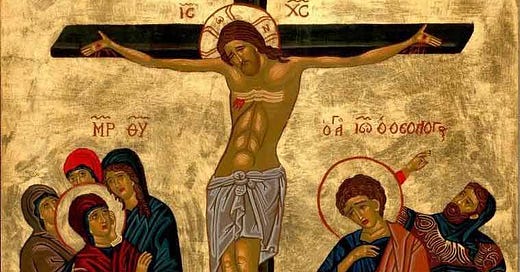The popular treatment of Original sin and its relation to Atonement is based on soteriological grounds, but many Church Fathers such as St. Maximus the Confessor viewed sin, Christ’s incarnation, and His atonement on the cross as cosmic events as well. Sin isn’t merely a moral failing of man, neither is the atonement merely God saving us from our moral failings.
In Plato’s “Phaedo”, Socrates argues from the nature of opposition that man not only has a body that perishes over time but a soul that is immortal. This sets up a grand narrative for Socrates and Plato on the basis that a virtuous man is a man that lives a life proper to the soul instead of the body since the characteristics of the soul are opposed to the needs and desires of the body. What is interesting is that St. Paul in his epistles uses the same kind of argumentation, but he does so with a twist: He puts (fallen) flesh as opposites to the soul. Thus the difference between Socrates and St. Paul is (original/ancestral) sin. For St. Paul and St. Maximus the Confessor, dialectical opposition is not something natural to the world, but rather an aspect of the fall. In his Disputation with Pyrrhus, St. Maximus tackles a specific Monothelite presupposition which states that the human will is in opposition to the Divine will. Although after the fall, there’s been an opposition between God and man, this opposition once again is not natural but due to sin. This also means that the pop-level Muslim objection to the incarnation being contradictory is resolved: Man and God are not opposites once we take sin away, the only thing that’s contrary to God is sin, thus sin is what introduces contradiction, opposition, and division into the universe.
As St. Paul says in 1 Timothy, Christ reconciles God to man in His person. To say that Christ had to face His Father’s wrath in order to atone for our sins is missing the point, Christ’s atoning work on the cross certainly cleansed our sins, so in a sense, He was our substitution, yet it wasn’t just that, but it was also a victory against death. He also reconciled the opposition between man and God by taking death in His body and crucifying it, resulting in His descent to Hades where He preached the gospel to the day, and the resurrection afterward, which by the virtue of Him taking our nature, we too are also predestined to be resurrected.
So then why does death and sin still prevail and corrupt goodness in this world? Even the Virgin Mary who was without sin fell asleep in the Lord prior to her ascension! This is because the effect of sin in our nature is corruption, which is inherited from Adam. Christ Himself who is our model had His humanity transfigure into its proper state of incorruption after the resurrection, which is the death of death. Likewise we too once we are resurrected will also attain this state of incorruption.
This makes the cosmic message of Christianity clear, our enemy is sin and our friend is God. God incarnated as man and deified our nature, not only that He is the ultimate example for us, and in order to restore our likeness, we must live His life. This is not only done by following His commandments but by being part of His body which He established as the pillar and ground of truth, since He is the Truth Himself, and His body that we can join today is the Orthodox Christian Church.


